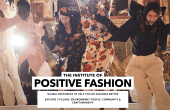The received notion is that wisdom comes with age, far away from the sharp smartness of youth. Yet combined together they give us the possibility of sustainable progress as the exuberant innovative creativity of the young combines with reflective experience, that hopefully comes with age, and cautions against swinging pendulums too far, reinventing wheels or developing ideas that become too destructive.

Kasia Wozniak. BA (Hons) Fashion: Styling & Photography
Looking at the turbulence that has beset the financial sector, it seems that the qualities of youth have ruled for the past few decades. A bubble was created where caution was thrown to the wind and new ideas and systems were developed that to an outsider seemed to have no basis in reality. This approach seemed to infect not only the financial sector but also other aspects of our society. For fashion, consumers shopped until they dropped, retail therapy –the ‘because I’m worth it’ solution – to our problems prevailed. It seemed as though consumption was the answer to any problem and what we consumed seemed to no longer matter. The hunt for the goods was the driving force not the quality or the aesthetic of the product. Factories across the world churned out cheap clothes and products to meet what at times seemed an almost insatiable appetite for goods. Fashionable clothes were no longer valued for the qualities that make them important to our lives, rather they became disposable, no longer treasured, and the human cost or the costs to the environment were of little consequence to the shopper. A bargain was what the consumer wanted and a bargain that was a label was even better. Labels became important, not for the quality of the design or for the fabrics used but because they were worn by celebrities, were featured in magazines and gossip pages and thereby carried an extra level of kudos. For many in the fashion industry, it had seemed for some time as though things were spinning out of control and was in no way sustainable.
Now wisdom is needed: we need to reflect on our recent mistakes and use that knowledge to create solutions that are truly workable. The recent meeting of the G20 – the leaders of the 20 most important economies in the world – called to try and agree a global way forward to minimize the effects of the financial crisis, demonstrated just how interdependent individual economies have become. Wisdom had shown us that acting alone will no longer work and that we must act together. For those of us connected to fashion we too need to rise to the challenge of creating an industry that allows for growth and development, but is based on sound principles that recognize that we operate in an interconnected world and that don’t exploit either the human or the physical.

Ivan Dauriz. MA Fashion and the Environment
It also means we must use this as an opportunity to celebrate fashion. We don’t want to lose or undermine the creative, innovative, dynamic heart of fashion. We need to use our wisdom to remember that fashion is not some modern invention linked to consumption but is rather an intrinsic part of our humanity. Amongst the earliest people, clothes may have begun as necessary covering but they soon became individualized and differentiated as our natural instincts to adorn and use our clothing to communicate ideas about ourselves rose to the fore. As Quentin Bell said: “ Our clothes are too much a part of us for most of us ever to be entirely indifferent to their condition: it is as though the fabric were indeed a natural extension of the body, or even the soul.” Understanding that developing a personal style that respects and values the qualities that makes fashion timeless is what we need to wisely strive for. Clothes that celebrate our personal qualities, that value the people who have designed and made them, that we can wear for more than one season but when we do no longer want them have a considered approach to their de-manufacture and disposal is the fashionable, yet wise world we need to strive for.
For Sublime Magazine. Issue 16 Wisdom




